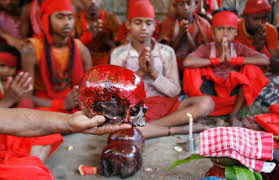Bengaluru, Jul 9: The new version of an anti-superstition Bill?proposes to ban 23 practices, including human torture in the name of rituals and display of miracles' to earn money.
 The draft Karnataka Prevention and Eradication of Human Sacrifices and other Inhuman Evil and Aghori Practices and Black Magic Bill-2016 is a modified version of the Karnataka Prevention of Superstitious Practices Bill-2013.
The draft Karnataka Prevention and Eradication of Human Sacrifices and other Inhuman Evil and Aghori Practices and Black Magic Bill-2016 is a modified version of the Karnataka Prevention of Superstitious Practices Bill-2013.
The copy of the Bill was circulated at the state Cabinet meeting on Friday.
The Bill will be debated in the next Cabinet meeting, too, and introduced in the ongoing legislature session, according to Law Minister T?B Jayachandra.
The 2013 Bill had met with resistance from various quarters as it proposed to ban numerology, astrology among others, and was referred to the scrutiny committee for modification. The 2016 Bill is yet to be made public.
According to sources, it lists out practices which are proposed to be banned and those which will not apply under the provisions of the Bill. (See chart) Besides social evils like human sacrifice and Aghori, the Bill proposes to ban made snana', the practice of people rolling over leftovers after Brahmins have partaken food in temples; and fire-walking, the act of walking barefoot on redhot embers, which is a common practice in Karnataka.
Unhealthy rituals
Human sacrifice; propagation of human sacrifice
Practices like made snana', fire-walking, banamati', bettale seve'
Torture in the name of exorcism
Display of miracles to earn money or terrorise people
Inhuman, evil and Aghori practices which endanger life
Practice of black magic in search of precious things
Creating fear in others by claiming to have supernatural powers
Creating panic by threatening to invoke ghosts
It won't apply to...
Worship
Teaching of ancient and traditional learning
Performance of prayers
All religious celebrations
Piercing of ears, nose in accordance with religious rituals
Advice of vastu shastra', astrology and advice with regard to source of groundwater





Comments
How can they pass this bill? Hindu religion is based on superstitions and the brahmins are preying upon the fears created on the lower classes.
Please also add in the ban list - worshipping dead.
Add new comment